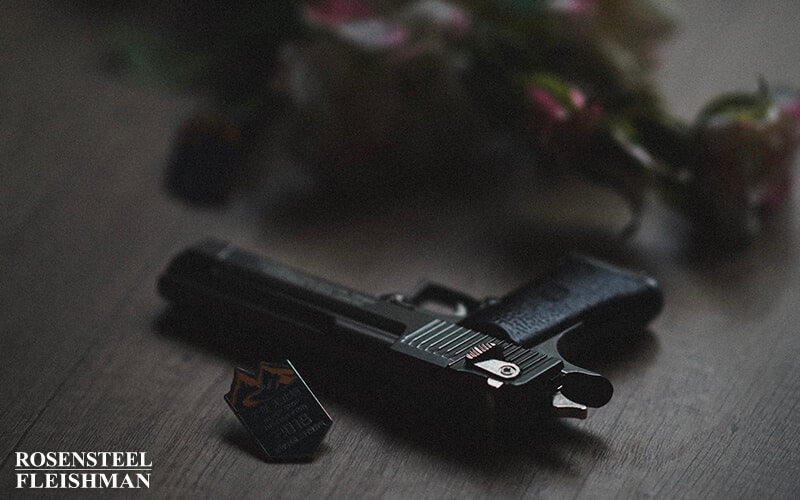Criminal Defense Lawyer for Concealed Weapon Charges

Carrying a concealed weapon in North Carolina is a serious offense that can result in significant legal consequences, including potential jail time. If you’ve been charged with this crime, an experienced defense attorney can assess how the law applies to the specific facts of your case and help determine the most effective course of action. Call Mr. Rosensteel today so he can begin reviewing your case and protecting your rights.
Consult a Charlotte Prostitution Lawyer
In North Carolina, it is a crime to carry a concealed weapon unless you are on your own premises. To show that a person violated the concealed carry statute, the following elements must be evidenced:
- the person must be off his own premises
- the person must carry a deadly weapon
- the weapon must be concealed about his person
A weapon does not include an “ordinary pocket knife” under the statute. An “ordinary pocket knife” is defined as a “small knife, designed for carrying in a pocket or purse, that has its cutting edge and point entirely enclosed by its handle, and that may not be opened by a throwing, explosive, or spring action.”
The concealed carry statute specifically lists weapons which are included in this section. They are:
- bowie knife
- dirk
- dagger
- sling shot
- loaded cane
- metallic knuckles
- razor
- shurikin
- stun gun
- other deadly weapon of like kind
- any pistol or gun
A person who violates the concealed carry statute for the first time is guilty of a Class 2 misdemeanor. The punishment for a Class 2 misdemeanor ranges from 1-60 days, depending on prior convictions. A person with no prior convictions can be sentenced to up to 30 days, but this punishment must be community punishment.
A person who violates the concealed carry statute for a second or subsequent time is guilty of a Class H felony. North Carolina law provides that a person who commits a Class H felony must receive a sentence between 4 and 25 months, depending on the person’s prior convictions. A person with no prior convictions may receive a community or intermediate punishment, but the court is permitted to sentence any person convicted of a Class H felony to active jail time.
Exceptions
There are certain exceptions to the concealed carry statute. The prohibition does not apply to
- a person who carries a handgun, has a concealed handgun permit, and is carrying the handgun in accordance with the scope of the concealed handgun permit
- a person who carries a handgun who is exempt from obtaining a permit as a law enforcement officer or qualified law enforcement officer, the handgun is in a closed compartment or container within the person’s locked vehicle, and the vehicle is in a parking area that is owned or leased by the State government
When prosecuting a concealed carry crime, the State does not have an initial burden of producing evidence to show that the accused’s carrying of a concealed weapon is not an exception under the statute. However, once the accused shows some evidence that his carrying of a concealed weapon is an exception under the statute, the burden of showing that the accused actions fall within the scope of the statute is on the State.
Defenses
The statute also sets out two defenses to the crime of carrying a concealed weapon. The first is that:
- the weapon was not a firearm
- the defendant was engaged in, or on the way to or from, an activity in which he legitimately used the weapon
- the defendant possessed the weapon for that legitimate use
- the defendant did not use or attempt to use the weapon for an illegal purpose
The burden of proving this defense is on the accused.
The second defense is that:
- the deadly weapon is a handgun
- the defendant carries a concealed handgun permit and is a member of the armed forces
- the defendant provides to the court proof of deployment, such as the deployment orders or other written notification showing the defendant’s deployment dates
Compliance with Concealed Handgun Permit
Having a concealed handgun permit does not entitle a person to conceal carry a handgun wherever and whenever he pleases. An important restriction of the concealed handgun permit is that it is unlawful for a person to carry a concealed handgun, even if the person has a concealed handgun permit, while consuming alcohol or when alcohol or a controlled substance remains in the person’s body. However, if a person has a controlled substance in his blood and the controlled substance was lawfully obtained and taken in therapeutically appropriate amounts, the person does not violate this provision.
In addition, the concealed handgun statute does not authorize a person to carry a concealed handgun:
- on educational property
- into an assembly for which admission has been charged for entry
- into an establishment which sells alcoholic beverages
- into the State Capitol Building, the Executive Mansion, the Western Residence of the Governor, or any building housing any court
- at a parade, funeral procession, or demonstration
- in an area prohibited by federal law
- in a law enforcement or correctional facility
- in State or federal offices
- on any private premises where a notice prohibiting the carrying of a concealed weapon is conspicuously posted
A person who carries a firearm onto educational property commits a Class I felony. North Carolina law provides that a person who commits a Class I felony must receive a sentence between 3 and 12 months, depending on the person’s prior convictions. A person with no prior convictions must receive a community punishment, but the court is permitted to sentence a person with prior convictions to active jail time.
A person who carries a powerful explosive onto educational property commits a Class H felony. North Carolina law provides that a person who commits a Class H felony must receive a sentence between 4 and 25 months, depending on the person’s prior convictions. A person with no prior convictions may receive a community or intermediate punishment, but the court is permitted to sentence any person convicted of a Class H felony to active jail time.
A person who:
- carries a gun, rifle or pistol into an assembly for which admission has been charged for entry or into an establishment which sells alcoholic beverages
- carries a deadly weapon into the State Capitol Building, the Executive Mansion, the Western Residence of the Governor, or any building housing any court
- possesses a deadly weapon at a parade, funeral procession or demonstration
commits a Class 1 misdemeanor. North Carolina statute provides that a person who commits a Class 1 misdemeanor receives a sentence between 1 day and 120 days, depending on their prior convictions. A person with no prior convictions cannot receive more than a 45-day sentence, and this sentence must be community punishment. However, it is possible for a person with one or more prior convictions to receive active jail time as a punishment.
Constructive Possession
Constructive possession can be sufficient to prove that a defendant “carried” a concealed weapon. Constructive possession occurs when a person does not have actual possession but “has the intent and capability to maintain control and dominion over” the weapon. For example, when a defendant drove a borrowed car in which a gun was concealed, he had the power to control the contents of the car. In addition, the fact that the gun was located near the driver’s seat and that the defendant admitted that he owned the gun showed that the defendant carried the concealed weapon.
Speak to a Charlotte, NC Concealed Weapon Lawyer Today
At Rosensteel Fleishman Car Accident & Injury Lawyers, our experienced criminal defense lawyers are here to help you fight your concealed weapon charge. North Carolina law provides for the issuance of concealed carry permits, but if you have been charged with carrying a concealed weapon without a permit, you need an experienced lawyer to help you navigate the complex legal system and defend your rights.
Our attorneys have a thorough understanding of the laws surrounding concealed carry and the rights of gun owners. We will apply our knowledge and experience to help you build a strong defense and work toward a resolution that aligns with your best interests.
Call (704) 714-1450 today to schedule a consultation with a Charlotte concealed weapon lawyer. We will work with you to understand the facts of your case, and help you take the necessary steps to defend your rights and protect your freedom.

